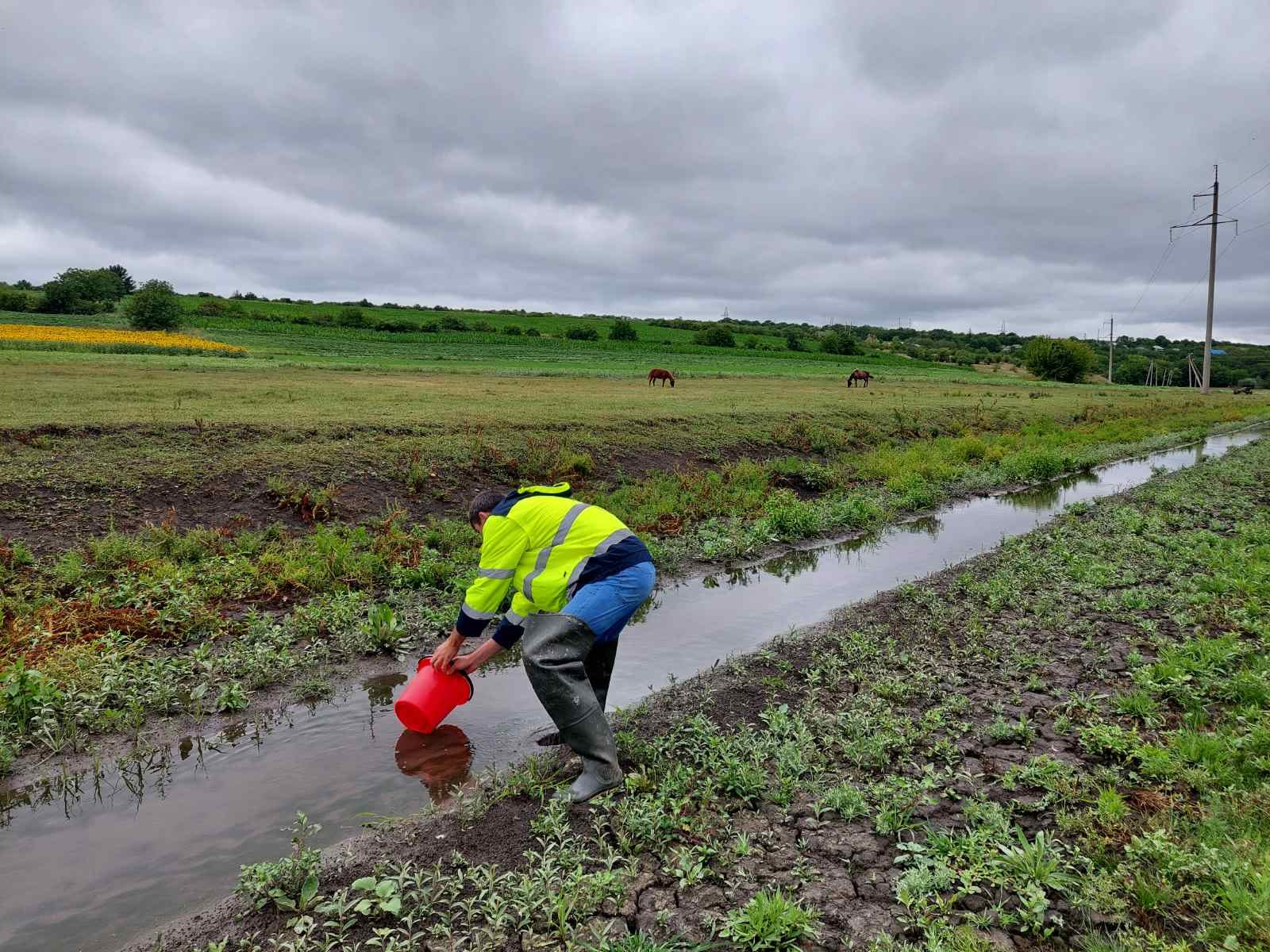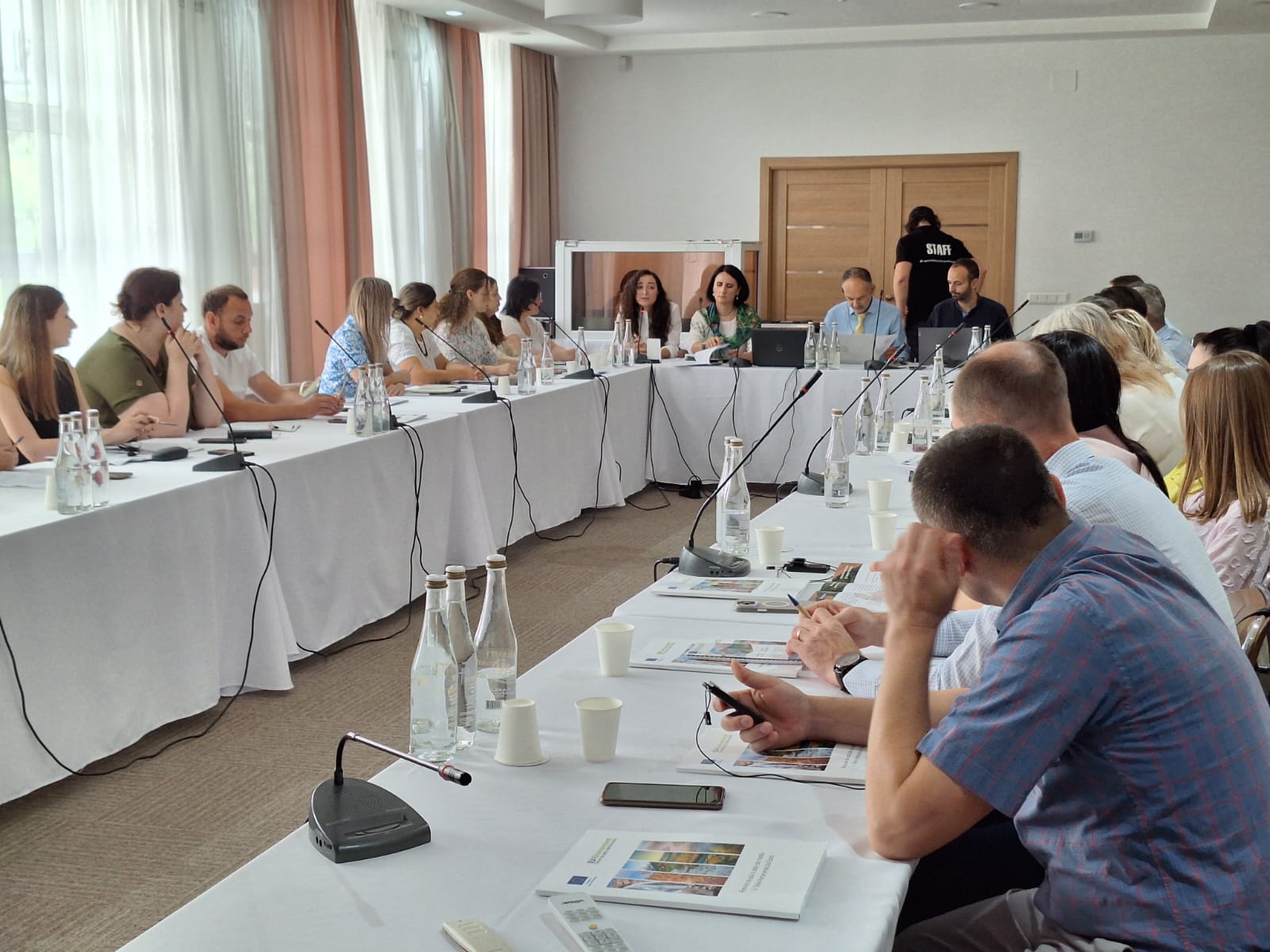- Country: Republic of Moldova
- Component: Other
- Activities : Other : Communication
News
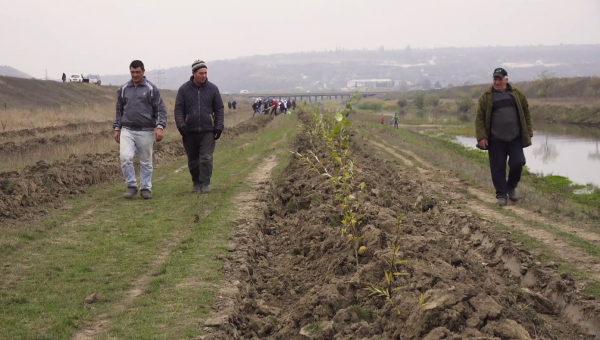
- Country: Republic of Moldova
- Component: Water resources
The EU4Environment – Water Resources and Environmental Data programme has been instrumental in helping Moldova enhance its water resources management, align with EU and international standards and address key challenges related to water use in agriculture, water supply and sanitation, water monitoring, and transboundary cooperation for water protection.
Improved River Basin Management
Although not yet an EU country, Moldova is already implementing the second cycle of River Basin Management Plans (RBMPs) for its two main river basin districts (RBD): the Danube-Prut and Black Sea and the Dniester RBD. These plans, developed with previous EU support, enable stakeholders to collectively plan key actions to prevent water pollution and overuse, and to achieve good overall water status.
Under the EU4Environment - Water Resources and Environmental Data programme, Moldova has focused on instruments to support the implementation of measures to address two major water use challenges: agriculture and domestic use.
Tackling nitrate pollution in agriculture
In order to comply with the EU Nitrates Directive, the project supported Moldova in carrying out a study on the protection of waters from nitrate pollution from agriculture, which will serve as a basis for the development of a National Action Programme for the protection of waters from nitrate pollution in agriculture. This programme aims to become mandatory in nitrate-vulnerable zones, where stricter protection measures aim to be implemented.
To complement these efforts, a Code of Good Agricultural Practice has already been developed earlier with EU support to guide farmers in sustainable practices. Nitrates are naturally occurring chemicals found in soil, air and water. However, they are also introduced in large quantities through fertilisers, animal waste, and wastewater, potentially harming rivers, groundwater, and public health. As a mitigation measure, riparian protection strips have been arranged along impacted rivers (see photo on top).
Improving access to water supply and sanitation for rural communities
In the Nirnova sub-basin, a pioneering Intercommunal Development Association (ADI) brought together 18 municipalities in a new form of governance to address rural water challenges in a more professional way.
This collaboration has resulted in a comprehensive master plan to improve water supply and sanitation for 30 villages in the districts of Hincesti and Nisporeni, benefiting 45,000 people. This new organisation has driven important developments in infrastructure development, particularly in the southern cluster. During this phase of the project, support was provided to prepare for the early selection of a future joint water and sanitation operator to ensure a smooth transition to more professional water works management and water billing.
Strengthening water monitoring for ecosystems and public health
The EU4Environment programme has carried out detailed surveys of Moldova’s rivers and groundwater, including the first joint surface water and groundwater survey in the Prut River Basin. These assessments go beyond physico-chemical parameters to include hydromorphology (river shape) and biological indicators (plants and animals), providing a holistic view of river health as required by the EU Water Framework Directive.
Moldova has also improved its laboratory capacity, receiving international accreditation in 2018 and 2021 for analyzing priority substances such as heavy metals, nutrients, pesticides, and pollutants. This ensures reliable data for policymakers and citizens.
The programme also introduced epidemiological wastewater monitoring, using wastewater to detect public health trends (e.g., SARS-CoV-2). This cost-effective method provides early and representative health data. Cooperation between Moldova’s water and health sectors has successfully established a routine monitoring system at the Chisinau wastewater treatment plant, benefitting public health decision-making.
Promoting Transboundary Cooperation
On 20 October 2023 in Kyiv, the Republic of Moldova, Ukraine, and Romania signed the Trilateral Declaration on Cooperation for the Prut River Basin, supported by the EU4Environment Water and Data programme.
The Prut river, a major tributary of the Danube, stretches for 953 km and forms a large part of the border between Moldova and Romania. The agreement strengthens joint efforts in water monitoring, flood and drought management, biodiversity conservation, and public participation. An official trilateral working group has been established and is now working under the umbrella of the ICPDR (International Commission for the Protection of the Danube River) to address key international issues on a basin-wide basis, based on this new agreement.
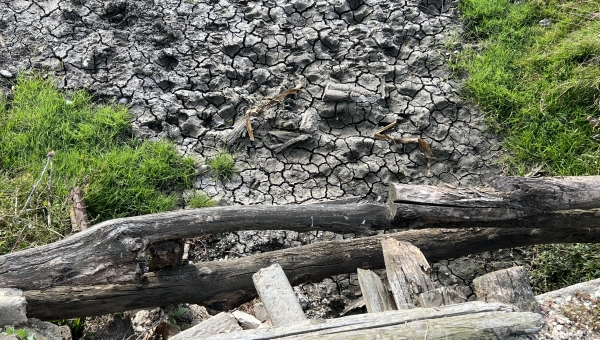
- Country: Republic of Moldova
- Component: Water resources
This 8 October , as the world marks Dam Removal Day, Moldova has its own story to tell. In 2024, the Ministry of Environment and the Environmental Protection Inspectorate reported the demolition of 51 illegally built dams on rivers such as the Ciulucul Mare and Ciulucul Mijlociu, Ialpugel, Draghiște, Ciuhur, Ciorna in the Răut river basin, as well as Ichel river , all tributaries of the Dniester.
Freeing rivers from unnecessary barriers to secure water for all
In Moldova, many small, unlicensed dams are built by local residents to secure water for cattle, crops, and other needs. Yet many such constructions were not permitted , and when poorly designed, unregulated, or too numerous, they can alterthe river flows, reducing water availability for other water users downstream, and degrading ecosystems.
At the request of Apele Moldovei, a pilot study carried out by UNECE as part of the EU-funded programme EU4Environment – Water&Data (2021–2024) in the Ișnovăț River, a tributary of the Bic and ultimately the Dniester, provided Moldova with its first inventory of dams — legal and illegal, active and abandoned. It revealed that many reservoirs were poorly maintained, silted, or even dried out, posing flood risks and cutting off communities and ecosystems from vital water flows.
By targeting the most problematic illegal dams, Moldovan authorities aim to restore fairer access to water and improve the resilience of river systems.
Solutions must go beyond dam demolition alone
Restoring rivers is essential for biodiversity, fish migration, as well as for maintaining natural floodplains that play an important role in flood retention . In a country already facing a projected 16–20% decline in surface flows by 2030 due to climate change, every drop of restored flow counts.
The challenge, however, is far more complex. Removing dams does not always mean rivers will resume their natural flow — in many places, the water simply isn’t there anymore. Decades of overuse, poor maintenance of infrastructure, and climate change have left scars too deep to heal in the short-term. At the same time, as there has been no water flow in the rivers for the last 10-15 years, and the rivers dry up over summer, certain dams continue to provide water for farming, animals, aquaculture , and livelihoods in rural areas where economic opportunities are limited.
The underlying challenge thus is a sustainable water balance and a fair sharing of water resources across the entire river. This requires changing former water and land use practices and a regular dialogue between all water users: farmers, industries, municipalities, and also nature conservationists caring about the often-forgotten ecosystems on which human life depends.
Strenghtening knowledge of rivers
In line with the EU Water Framework Directive and based on the findings of the pilot study carried out by UNECE in the Ișnovăț River Basin, the Government of Moldova adopted on 16 October 2024 a national methodology for identifying and monitoring hydromorphological changes in rivers— changes in rivers’ natural shape, flow, sediment transport, and connection with surrounding landscapes - caused by structures like dams, levees, or diversion channels. When excessive, these alterations weaken rivers’ natural ability to support biodiversity, regulate floods, decompose pollution, and recharge groundwater resources.
The adoption of this methodology marks a first step toward better understanding the physical condition and dynamics of Moldova’s rivers. It establishes a common analytical framework to assess where and how human activities — such as dams, riverbed modifications, or land use changes — are altering watercourses. Similar approaches have proven essential in EU Member States under the EU Water Framework Directive, where hydromorphology is recognised as a key “supporting element” for assessing the ecological status of rivers.
In Moldova, this methodology will provide the necessary baseline information to inform future water management measures.
Encouraging dialogue between water users
Healthy, living rivers need a degree of freedom: the ability to meander, to flood seasonally, and to connect with wetlands and groundwater. In many European countries, past efforts to tame rivers — by building dykes, digging canals, and draining wetlands — reduced flooding in the short term but also disconnected rivers from their ecosystems, making them less resilient to droughts and climate change. Moldova faces the same challenge: how to reconcile people’s needs with the ecological functions that sustain rivers.
The underlying challenge is thus to achieve a sustainable water balance and ensure the fair sharing of water resources across the entire river basin. This requires a change in former water and land use practices, as well as regular dialogue between all water users, including farmers, industries, municipal authorities and nature conservationists caring about the often-forgotten ecosystems on which human life depends.
Building on the experience of existing basin councils for the Prut, Dniester and Black Sea river basin, which already facilitate cooperation at transboundary and national levels, and whose work was supported by the EU4Envrionment -Water and Data (2021-2024) programme and other regional projects, the EU supports Moldova in extending this dialogue to more local scales. Through EU4Green Recovery East programme (2025-2028), efforts are now focused on establishing pilot councils at sub-basin and community levels—bringing together local authorities, farmers, and other stakeholders to discuss practical solutions. By strengthening dialogue where decisions are made, these initiatives aim to balance local water needs with the shared responsibility of protecting Moldova’s rivers.
The EU4Green Recovery East programme will thereby ensure continuity of support so that water is managed as a critical resource for people, nature, and the economy alike.
About EU4Green Recovery East
The EU4Green Recovery East programme (2025–2028) supports the countries of the EU’s Eastern Partnership in their transition towards greener, more resilient economies. With EU funding of EUR 21.3 million, it focuses on five areas: (1) circular economy, (2) water management, (3) legal approximation to EU environmental law, (4) environmental data integration, and (5) transboundary cooperation.
Implemented by a consortium led by the Environment Agency Austria (UBA) with OiEau, Expertise France, UNECE, OECD, and UNIDO, the programme builds on a decade of EU investments in the region.
More information: www.eu4greenrecoveryeast.eu
Disclaimer
This article was produced with the financial support of the European Union. The contents are the sole responsibility of the EU4Green Recovery East consortium and do not necessarily reflect the views of the European Union or the Governments of the Eastern Partnership countries.
- Date: 08 July 2024
- Country: Republic of Moldova
- Component: Water resources
On 1-5 July, the EU4Environment Water and Data Programme carried out a groundwater and surface water monitoring field survey in the Republic of Moldova.
The survey aimed to assess the impact of human pressures on rivers and groundwater in Moldova.
The sampled sites had not been monitored by the EU4Environment Water and Data programme during the previous surveys in 2022 and 2023.
This time, groundwater and surface water monitoring sites were selected to be close to each other. The aim of this survey was to identify possible connections between surface water and groundwater.
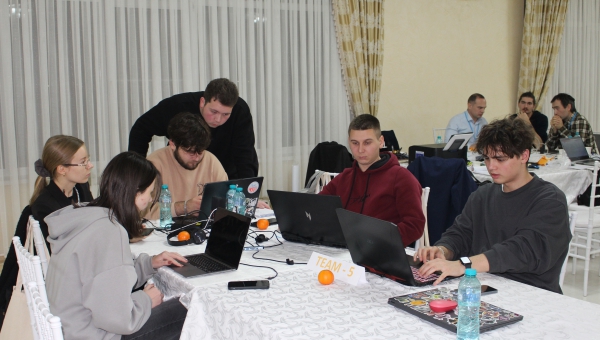
- Country: Republic of Moldova
- Component: Water resources
On 4-5 December 2024, 38 young innovators, water experts, and tech enthusiasts gathered in Moldova for an inspiring two-day Water Data Hackathon, to develop digital solutions to address Moldova's pressing water challenges by promoting the use of open source data.
Organised by the European Union’s EU4Environment Water Resources and Environmental Data programme in partnership with the NGO Renașterea Rurală and the Ministry of Environment of the Republic of Moldova, the event brought together students of IT, Geographic Information Systems (GIS), and water/environmental sciences to co-create tools for sustainable water management.
Why water data matters
Moldova’s water resources are under pressure from climate change, ageing infrastructure, pollution, and inefficient water use. With agriculture and industry relying heavily on rivers, lakes, and groundwater, the need to access reliable data to inform the public and the water managers is more important than ever. As the EU4Environment Water Resources and Environmental Data programme has developed actions to strengthen access to environmental datasets produced by the Moldovan administration, the hackathon aimed to promote the use of existing open datasets by encouraging participants to develop new information products and services based on datasets made available by the Moldovan sdministration and at global level (including open satellite information).
The Hackathon: A hub of creativity and collaboration
Participants—Moldovan students and young professionals—worked in multidisciplinary teams combining expertise in IT, GIS, and environmental sciences. Together, they developed innovative solutions to streamline the collection, visualisation, and accessibility of water data for decision-makers and citizens.
Focusing primarily on surface water quality and flood-related data, participants explored practical applications to improve water management. While each team impressed with their creativity and determination, the winning solutions showed exceptional ingenuity. The three winning teams came up with innovative and impactful solutions.
Looking Ahead
The top three teams received funding to finalise their proposal when possible into fully functional digital solutions. Beyond the prizes, the Water Data Hackathon inspired young professionals to actively contribute to Moldova’s sustainable development goals. It promoted the efficient use of environnemental open datasets, underscored the importance of interdisciplinary collaboration and highlighted the transformative potential of digital innovation in tackling environmental challenges.
- Country: Republic of Moldova
- Component: Water resources
Moldova's progress in the implementation of European Union directive on protection of waters against nitrate pollution from agricultural sources was discussed on 2 July at a workshop (EU Directive 91/676/EEC). The event brought together representatives from the Ministry of Environment, the Ministry of Agriculture and Food Industry, as well as national and international experts.
Irina Punga, Deputy Secretary General of the Ministry of Environment of the Republic of Moldova, presented the significant developments and the country's firm commitment to adopting sustainable agricultural practices to protect water resources.
The importance of the Action Programme for the Protection of Waters against Nitrate Pollution from Agriculture, which is essential for accession to the European Union and for environmental protection, was emphasised. The workshop was organised with the support of the EU4Environment - Water Resources and Environmental Data project.
Read the article (in Romanian) on the Ministry's website: https://www.mediu.gov.md/ro/content/4969



